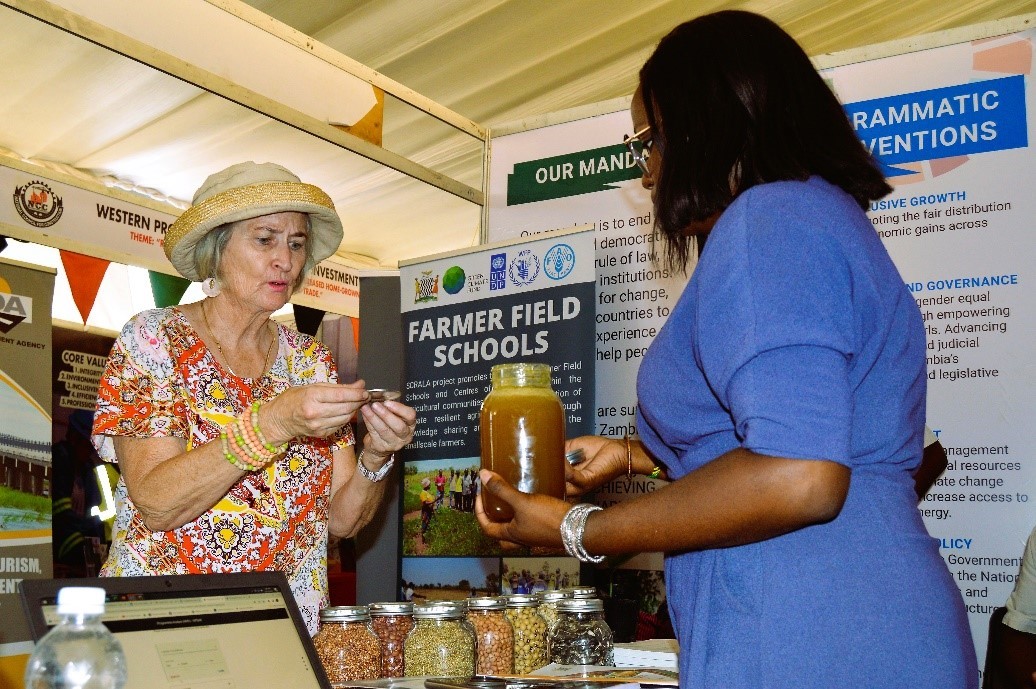UNDP Makes the Mongu Expo a Sweet Experience
September 30, 2022

A guest samples Sioma Honey, produced by farmers opting for alternative livelihood in Sioma District, a SCRALA project site
The month of October 2022 was a hive of activities that saw all roads lead to Mongu to witness yet another Expo, which is part of the now widely acclaimed Provincial Expositions, bringing together a diverse range of companies from both the private and public sector with the aim of discovering and show-casing investment and trade opportunities. encourage the economic development of this province through Agriculture, Tourism, Manufacturing and Mining
The United Nations Development Programme (UNDP) was quick to identify itself with the western province expo, whose theme "Rapid Economic Transformation Through Increased Home-Grown Entrepreneurship, Value Addition and Trade" gave the agency an impetus to show-case its home-grown solutions amidst climate change, which has ravaged four of the 16 districts in the province.
Speaking during the official opening of the Expo, His Excellency the Republican President, Mr. Hakainde Hichilema explained that expos provided a window to attract investment and accelerate development and economic growth. He emphasized the importance of locally grown investments and reiterated that the province enjoyed natural resources that could be harnessed for national and international export. He cited the cultivation and harvesting of rosewood for furniture production, livestock breeding and honey production, which need to be unlocked.
The role of the youth in development was accentuated.
The Expo also gave the United Nations (UN) in Zambia an opportunity to shade light on the reasons the Expo in western province was significant to the UN in Zambia. Dr. Nathan Bakyaita, who was representing the United Nations Resident Coordinator and who is also World Health Organisation (WHO) Resident Representative pointed out that the UN system in Zambia has been associated with western province through the Strengthening climate resilience of agricultural livelihoods in Agro-Ecological Regions I and II in Zambia (SCRALA) project.
Dr. Bakyaita said the UN in Zambia was elated with western province’s inaugural expo as it would contribute to improving the livelihoods of the local people for maximum impact to help reduce poverty, increase income and food security for agricultural dependent rural communities and inclusive growth.
He said the SCRALA project was “a partnership with the Government of Zambia to strengthen the resilience of small-scale farmers against climate risk and supports the Government of Zambia to strengthen the capacity of farmers to plan for climate risks that threaten to derail development gains. Further, the project promotes climate resilient agricultural production and diversification practices to improve food security and income generation, improve access to markets, and foster the commercialization of climate-resilient agricultural commodities.”
Through UNDP and the SCRALA project, the UN also had a stand at the Expo, which gave opportunities to guests gain insight into the operations of the UN in western province and beyond. The stand attracted various government officials, business entities and cooperating partners.
The SCRALA project being implemented in 16 districts across the country; Senanga, Sesheke, Sioma and Mulobezi districts, is an excellent collaboration between the Government of the Republic of Zambia and cooperating partners.
The UN has so far contributed 863,000 United States Dollars over the past three (3) years to promote resilience in agricultural livelihoods and markets in Western Province through the SCRALA (Strengthening Climate Resilience for Agricultural Livelihoods in Agro) Project.
The Expo also provided an opportunity for delegates to participate in various meetings and for a that were organized to share and network on improving the development platform in Western Province.

 Locations
Locations